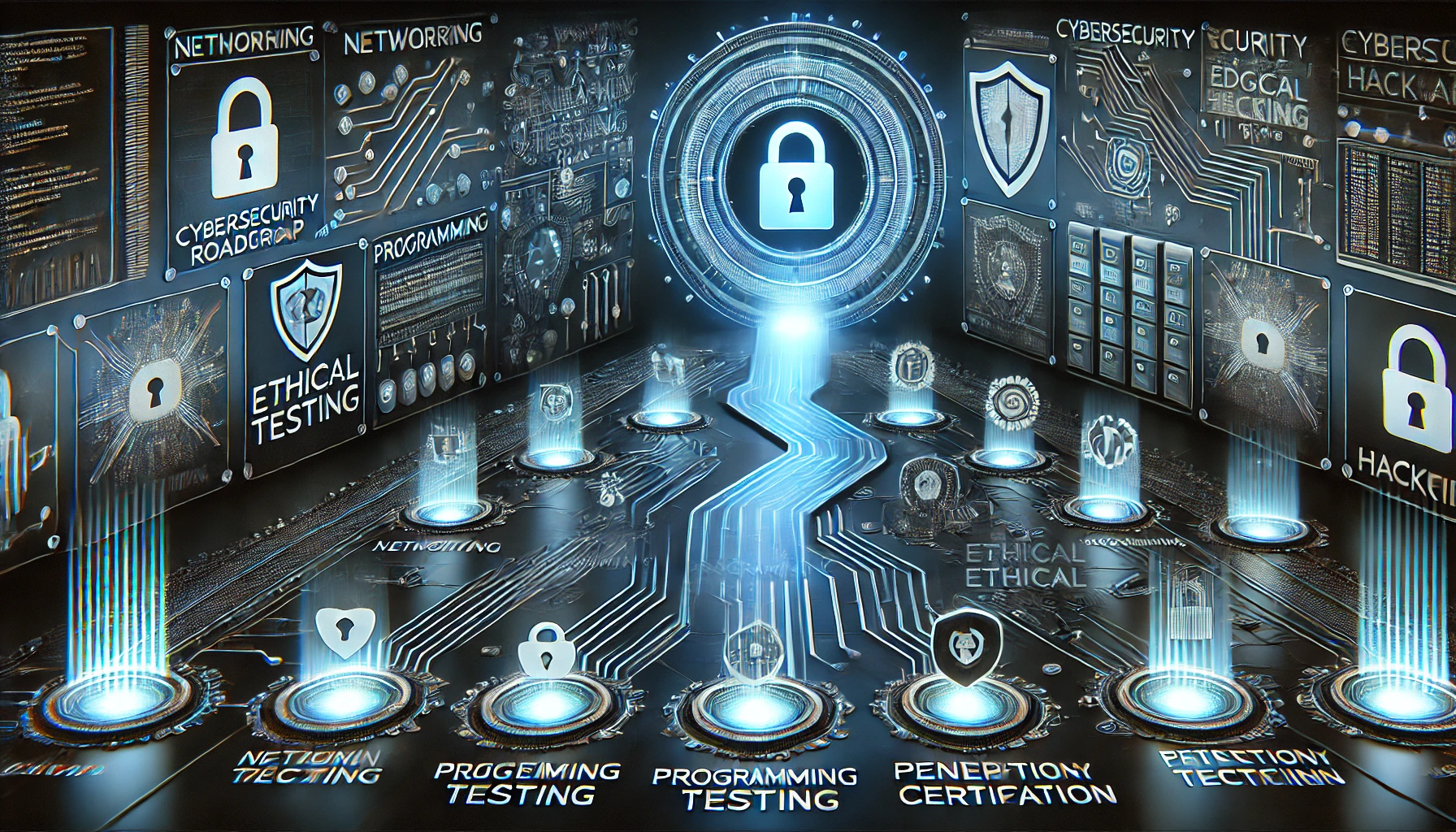Cybersecurity Roadmap: Your Ultimate Guide to Becoming an Ethical Hacker
In today’s increasingly digital world, cybersecurity is more critical than ever. With the rise of cyber threats, companies need professionals who can protect systems, networks, and data. The path to becoming an ethical hacker or cybersecurity expert can seem daunting. However, by following a structured cybersecurity roadmap, you can gain the skills and certifications needed to thrive in this field.
This guide outlines a step-by-step cybersecurity roadmap, from mastering essential computer and networking skills to earning advanced certifications like OSCP. By following these steps, you’ll be equipped with the knowledge and hands-on experience necessary to become a proficient ethical hacker.
1. Start with Computer Skills
Before diving into specialized cybersecurity topics, it’s crucial to develop a strong foundation in basic computer skills. These are the building blocks for understanding how computers, operating systems, and networks function.
Learn how to navigate different operating systems, troubleshoot common issues, and familiarize yourself with software installation and system management. A good starting point might be learning about:
File systems and data storage
Basic computer hardware and software operations
Operating system interfaces like Windows, macOS, and Linux
These fundamental skills will give you the knowledge needed to explore more complex areas of cybersecurity.
2. Master Linux Skills
Linux is a favorite operating system among hackers due to its flexibility, security, and open-source nature. Learning Linux is essential for anyone interested in cybersecurity as it offers a wealth of tools used in penetration testing and security assessments.
To get started:
Learn the command line interface (CLI)
Explore popular Linux distributions like Ubuntu or Kali Linux
Practice using Linux-based security tools (Nmap, Wireshark, etc.)
Mastering Linux is a critical step in your cybersecurity journey, as many ethical hacking tools are built for or work best on Linux environments.
3. Develop Networking Skills
Networking skills are at the core of cybersecurity. Understanding how data travels through networks, how protocols operate, and how systems connect is essential for identifying vulnerabilities.
Key networking concepts to focus on include:
TCP/IP, HTTP, DNS, and other fundamental protocols
Subnetting and IP addressing
Network topologies and architecture
Grasping these concepts will enable you to understand potential security loopholes and how attackers exploit them.
4. Learn Programming Skills
Programming is a crucial part of becoming an effective ethical hacker. While you don’t need to be a coding expert, understanding scripting languages like Python and Bash will help you automate tasks, develop custom scripts, and explore vulnerabilities more effectively.
Common programming languages used in cybersecurity include:
Python: Great for scripting and automation
Bash: Useful for creating scripts in Linux
JavaScript: Helpful for web-based penetration testing
Start by learning how to write simple scripts to automate penetration tests or system scans.
5. Take Practical Ethical Hacking Courses (PEH)
Once you have the foundational knowledge in place, it’s time to learn the practical side of hacking. PEH by TCM Security is a course designed to teach ethical hacking techniques with a focus on practical applications. You’ll dive into:
Reconnaissance and footprinting
Scanning and enumeration
Exploiting vulnerabilities
These hands-on skills will provide you with a real-world understanding of how ethical hackers operate.
6. Practice on Hack The Box (HTB)
Hack The Box (HTB) is an online platform offering cybersecurity training in a gamified environment. HTB allows you to practice hacking against real-world systems and hone your skills through Capture the Flag (CTF) exercises. HTB offers:
A wide range of challenges that simulate real-life hacking scenarios
Collaborative learning opportunities within the cybersecurity community
A learning path that grows more difficult as you progress
Regular practice on HTB will refine your hacking skills, allowing you to build confidence as you work through increasingly complex problems.
7. Explore TryHackMe (THM)
Similar to HTB, TryHackMe (THM) is an online cybersecurity learning platform. It is beginner-friendly, offering a wide variety of virtual labs and exercises that cater to individuals at any skill level. TryHackMe focuses on:
Hands-on training with interactive lessons
A browser-based interface, making it easy to access from anywhere
Structured learning paths, such as “Pre-Security,” “Cyber Defense,” and “Offensive Security”
Engage in TryHackMe’s real-world scenarios to gain practical experience.
8. Earn the eJPT Certification
The eLearnSecurity Junior Penetration Tester (eJPT) certification is an excellent credential for beginner ethical hackers. The eJPT is an entry-level certification that evaluates your ability to conduct penetration tests and exploit vulnerabilities in networks and web applications.
With this certification, you’ll demonstrate your readiness for a career in cybersecurity, making it a valuable addition to your portfolio.
9. Prepare for OSCP Certification
The Offensive Security Certified Professional (OSCP) certification is one of the most respected certifications in the field of penetration testing. It is designed for those serious about pursuing ethical hacking as a career.
This course teaches advanced penetration testing methods, requiring you to:
Conduct comprehensive security assessments
Exploit vulnerabilities in real-world environments
Perform detailed vulnerability assessments
The OSCP certification is a challenging but rewarding step in advancing your cybersecurity career.
10. Keep Learning: Cybersecurity Is an Ongoing Journey
Cybersecurity is a constantly evolving field. After obtaining certifications and gaining hands-on experience, it’s essential to keep your skills up to date. New threats emerge daily, and staying informed about the latest techniques, vulnerabilities, and tools is key to remaining effective as a cybersecurity professional.
Continue learning through:
Reading cybersecurity blogs and whitepapers
Attending cybersecurity conferences and webinars
Engaging in advanced certifications (like CISSP, CISM, etc.)
The journey to becoming a skilled ethical hacker doesn’t stop at a certification—keep pushing yourself to learn and grow in this exciting field.
Conclusion: Cybersecurity Roadmap: A Step-by-Step Guide for Aspiring Ethical Hackers
This cybersecurity roadmap provides a clear and structured path to becoming an ethical hacker. By building foundational skills, gaining hands-on experience, and earning industry-recognized certifications, you can pave the way for a successful career in cybersecurity. Start your journey today and secure your future as a skilled ethical hacker.

















